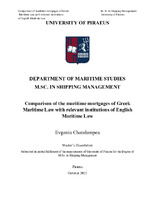Comparison of the maritime mortgages of Greek maritime law with relevant institutions of English maritime law

Master Thesis
Συγγραφέας
Χαραλαμπέα, Ευγενία
Charalampea, Evgenia
Ημερομηνία
2023-10-31Επιβλέπων
Δανιήλ, ΓεώργιοςDaniil, Georgios
Προβολή/
Λέξεις κλειδιά
Shipping industry ; Shipping cycles ; Capital ; Debtor ; Lender ; Collateral ; Simple mortgage ; Preferred mortgage ; Maritime liens ; Bank ; Credit ; FundingΠερίληψη
Είναι γνωστό ότι το μεγαλύτερο μέρος του παγκόσμιου εμπορίου σήμερα μεταφέρεται δια θα λάσσης, επομένως είναι προφανές ότι υπάρχει στενή σχέση μεταξύ του παγκόσμιου εμπορίου
και της ναυτιλιακής βιομηχανίας. Αλλά η ναυτιλιακή βιομηχανία είναι επίσης μια σημαντικά
ευάλωτη βιομηχανία, καθώς εξαρτάται από διάφορους επιπλέον εξωτερικούς παράγοντες όπως η
γεωπολιτική κατάσταση, οι περιβαλλοντικές συνθήκες, ο πληθωρισμός, οι εθνικές πολιτικές
σχετικά με τη ναυπηγική βιομηχανία, η αυξημένη ζήτηση για ορισμένα αγαθά, η απότομη αλλα γή στην τιμή των βασικών πρώτων υλών κλπ. Είναι επίσης ένας κλάδος που φαίνεται να δρα κυ κλικά, πράγμα που σημαίνει ότι υπάρχουν καταστάσεις που φαίνεται να επαναλαμβάνονται σε
τακτά χρονικά διαστήματα και επομένως ονομάζονται ναυτικοί κύκλοι και αποτελούνται από 4
φάσεις (ύφεση, ανάκαμψη, αιχμή και κατάρρευση) . Έτσι, λόγω της εξάρτησης της ναυτιλιακής
βιομηχανίας από τόσους πολλούς εξωτερικούς και μερικές φορές απρόβλεπτους παράγοντες,
υφίσταται η ανάγκη χρηματοδότησης του πλοιοκτήτη για την απόκτηση, τη συντήρηση ή τη λει τουργία ενός πλοίου, που είναι εργασίες έντασης κεφαλαίου, γιαυτό το λόγο οι πλοιοκτήτες λαμ βάνουν δάνεια από χρηματοπιστωτικά ιδρύματα. Αλλά από την άλλη πλευρά, τα χρηματοπιστω τικά ιδρύματα που χορήγησαν το δάνειο πρέπει να διασφαλίσουν ότι τα χρήματά τους είναι ασφαλή, έτσι το ίδιο το πλοίο καθίσταται ως εγγύηση για τους δανειστές του ιδιοκτήτη του, υφι στάμενο την εγγραφή βάρους σε αυτό, τη λεγόμενη ναυτική υποθήκη, απλή ή προτιμώμενη. Ένας άλλος θεσμός που συνδέεται στενά με τις ναυτιλιακές συναλλαγές είναι τα ναυτικά προ νόμια, τα οποία αποτελούν ασφάλεια στο πλοίο, οι οποίες προκύπτουν ταυτόχρονα με τις υπηρε σίες ή τα γεγονότα που ενεργοποιούν τη θαλάσσια δέσμευση. Οι πλοιοκτήτες υπόσχονται να ασφαλίσουν το χρέος των πιστωτών μέσω του ίδιου του πλοίου. Ως συμφέρον σε ακίνητο, το ναυτικό προνόμιο εκτείνεται μόνο έως την αξία του περιουσιακού στοιχείου, που είναι η αξία του πλοίου. Αυτοί οι θεσμοί, δηλαδή οι ναυτικές υποθήκες και τα ναυτικά προνόμια ρυθμίζονται διαφορετι κά τόσο στην ελληνική όσο και στην αγγλική δικαιοδοσία, αλλά ο στόχος και των δύο δικαιοδο σιών παραμένει η παροχή ασφάλειας στη ναυτιλιακή βιομηχανία, παρέχοντας το ίδιο το πλοίο ως εγγύηση.


